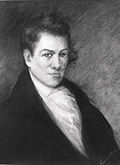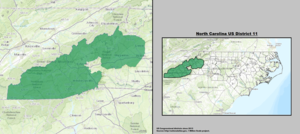Top Qs
Timeline
Chat
Perspective
North Carolina's 11th congressional district
U.S. House district for North Carolina From Wikipedia, the free encyclopedia
Remove ads
North Carolina's 11th congressional district encompasses most of Western North Carolina. Since January 3, 2023, the district has been represented by Chuck Edwards.[3]
Remove ads
The 11th district has historically been known for its volatile politics and was once considered one of the most competitive congressional districts in North Carolina. It was traditionally anchored by the heavily Democratic city of Asheville, with the rest of the district being split between Democratic-leaning counties in the south and Republican-leaning counties in the north. Consequently, congressional races were historically hard-fought and often very close.
In 2011, the Republican-controlled legislature redrew the district, shifting much of Asheville to the 10th district, where the city's Democratic tilt was diluted by the overwhelming Republican inclination of the rest of the district. The new map split Asheville in such a way that in some neighborhoods, one side of the street moved to the 10th while the other side of the street stayed in the 11th.[4]
To make up for the loss in population, the 11th absorbed some strongly Republican territory in the Foothills which had previously been in the 10th. On paper, it was one of the most Republican districts in the state. Due to the district becoming much more conservative, three-term Democratic incumbent Heath Shuler did not run for reelection in 2012, and was succeeded by Republican Mark Meadows.
In 2019, a panel of North Carolina judges ruled that the existing map was a partisan gerrymander, and ordered new congressional districts to be drawn ahead of the 2020 election.[5] After review in December, a new map was approved.[6][7] The district included the western part of Rutherford County and the entirety of Avery, Buncombe, Cherokee, Clay, Graham, Haywood, Henderson, Jackson, Macon, Madison, McDowell, Mitchell, Polk, Swain, Transylvania, and Yancey Counties. It still leans Republican, but much less so than the previous iteration, as it once again includes all of Asheville.[6][7]
On February 23, 2022, the North Carolina Supreme Court approved a new map only for the 2022 United States House of Representatives elections which had removed Avery and Mitchell Counties from the district.[8]
On October 25, 2023, the North Carolina General Assembly redrew and approved a new congressional map adding Avery, and Mitchell counties back to the district while removing Rutherford County, and splitting Polk County, shifting those over to the 14th congressional district.
Remove ads
Counties
For the 119th and successive Congresses (based on the districts drawn following a 2023 legislative session), the district contains all or portions of the following counties and communities.[9][10][11]
Avery County (9)
- All nine communities
Buncombe County (13)
- All 13 communities
Cherokee County (3)
- All three communities
Clay County (1)
Graham County (3)
- All three communities
Haywood County (6)
- All six communities
Henderson County (18)
- All 18 communities
Jackson County (9)
- All nine communities
Macon County (2)
Madison County (3)
- All three communities
McDowell County (5)
- All five communities
Mitchell County (2)
Polk County (2)
Swain County (3)
- All three communities
Yancey County (1)
Remove ads
Recent election results from statewide races
Remove ads
List of members representing the district
Remove ads
Past election results
2006
2008
2010
2012
2014
2016
2018
2020
2022
2024
Remove ads
See also
Notes
- Supported the Jackson faction in the 1824 United States presidential election.
References
Further reading
External links
Wikiwand - on
Seamless Wikipedia browsing. On steroids.
Remove ads























